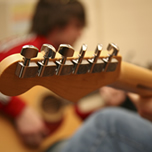
Keeping Healthy as a Guitarist
The Benefits of Keeping Healthy as a Guitarist
Playing the guitar is a fulfilling and enriching activity that offers numerous artistic, emotional, and even physical benefits. However, the demands it places on the body, especially on the hands, wrists, back, and shoulders, can lead to discomfort, strain, and injury if proper care is not taken. This essay explores the importance of maintaining good health as a guitarist, outlining the benefits of various practices such as warming up, taking regular breaks, maintaining physical fitness, practicing good posture, stretching, and seeking medical advice when necessary.
Warm Up Prior to Playing
Warming up before playing the guitar is crucial for several reasons. It prepares the muscles and tendons in your hands and arms for the physical activity ahead, thereby reducing the risk of injury. A proper warm-up increases blood flow to these areas, enhancing flexibility and responsiveness. Simple exercises like finger stretches, scales, and chromatic exercises can suffice. These activities help to loosen up your fingers and hands, making your playing more fluid and less prone to strain. Furthermore, warming up can also help to mentally prepare you for your practice or performance, ensuring that you are focused and ready to play your best.
Take Regular and Productive Breaks
Once you are warmed up and playing, it’s important to continue prioritizing injury prevention by taking regular breaks. Prolonged playing without breaks can lead to repetitive strain injuries (RSIs) such as tendonitis and carpal tunnel syndrome. By taking breaks every 20-30 minutes, you give your muscles and tendons time to rest and recover, which helps to prevent these issues. During these breaks, engaging in productive activities such as stretching or light exercises can further enhance your overall playing endurance and prevent stiffness. These short interruptions can also serve as a mental reset, improving your focus and creativity when you return to playing.
Treasure Your Hands
Guitarists rely heavily on their hands, making hand care an essential aspect of their overall health regimen. Keeping your hands healthy involves more than just avoiding injuries; it includes maintaining good hand hygiene, moisturizing regularly to prevent skin cracks, and keeping your nails at an optimal length to avoid interference with your playing. Strengthening the muscles in your hands and fingers through targeted exercises can also enhance your playing ability and reduce the risk of strain. Tools like stress balls, grip strengtheners, and hand-specific exercise routines can be beneficial.
Strengthen Your Muscles
A strong, fit body supports more effective and injury-free guitar playing. Strengthening the muscles in your arms, shoulders, back, and core can help you maintain proper posture and reduce the physical strain associated with playing the guitar. Core strength, in particular, is vital for supporting good posture and reducing the risk of back pain. Regular exercise routines that include weight training, resistance exercises, and aerobic activities can contribute to overall physical fitness, enhancing your stamina and reducing fatigue during long practice sessions or performances.
Stand Up Straight
Maintaining good posture while playing the guitar is crucial for preventing musculoskeletal problems. Whether sitting or standing, ensure that your back is straight, shoulders are relaxed, and the guitar is positioned comfortably. Poor posture can lead to back, neck, and shoulder pain, which can severely impact your ability to play. Using a footstool or a guitar strap can help achieve a comfortable playing position. Additionally, being mindful of your posture during practice sessions can lead to better habits and reduce the risk of long-term issues.
Stretch After You Play
Just as warming up is important before playing, stretching after playing is equally vital. Stretching helps to relax and lengthen the muscles that have been contracted during playing, aiding in recovery and reducing muscle stiffness. It can prevent the buildup of tension and help maintain flexibility. Incorporating stretches for your hands, arms, shoulders, and back into your post-playing routine can be very beneficial. These stretches should be gentle and controlled, focusing on relieving tension and promoting relaxation.
Keep Your Hands Healthy As A Guitarist
In addition to regular exercises and stretches, keeping your hands healthy also involves being mindful of your playing technique. Avoid excessive force and tension while playing, as this can lead to strain and injury. Pay attention to how your hands feel and make adjustments to your technique as necessary to ensure that you are playing comfortably. Using lighter gauge strings and adjusting your guitar setup can also reduce the amount of pressure required to play, making it easier on your hands.
Seek Help When You Feel Pain
One of the most important aspects of staying healthy as a guitarist is recognizing when you need help. If you experience pain or discomfort while playing, it is crucial to address it promptly. Ignoring pain can lead to more serious injuries that may require longer recovery times and even impact your ability to play. Consult with a medical professional, such as a doctor or physical therapist, who can provide advice and treatment options. Early intervention can prevent minor issues from becoming major problems and ensure that you can continue playing the guitar for years to come.
Maintaining good health is essential for any guitarist who wants to play effectively and enjoyably over the long term. By incorporating practices such as warming up, taking regular breaks, maintaining physical fitness, practicing good posture, stretching, and seeking medical advice when necessary, guitarists can prevent injuries and enhance their playing ability. A healthy guitarist is not only able to play more comfortably and with greater endurance but can also experience the full joy and creative expression that the instrument offers. Prioritizing health and well-being is, therefore, an investment in both the longevity and quality of one’s musical journey.







